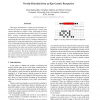Free Online Productivity Tools
i2Speak
i2Symbol
i2OCR
iTex2Img
iWeb2Print
iWeb2Shot
i2Type
iPdf2Split
iPdf2Merge
i2Bopomofo
i2Arabic
i2Style
i2Image
i2PDF
iLatex2Rtf
Sci2ools
175
click to vote
CVPR
2011
IEEE
2011
IEEE
Novelty detection from an Ego-centric perspective
This paper demonstrates a system for the automatic extraction of novelty in images captured from a small video camera attached to a subject’s chest, replicating his visual perspective, while performing activities which are repeated daily. Novelty is detected when a (sub)sequence cannot be registered to previously stored sequences captured while performing the same daily activity. Sequence registration is performed by measuring appearance and geometric similarity of individual frames and exploiting the invariant temporal order of the activity. Experimental results demonstrate that this is a robust way to detect novelties induced by variations in the wearer’s ego-motion such as stopping and talking to a person. This is an essentially new and generic way of automatically extracting information of interest to the camera wearer and can be used as input to a system for life logging or memory support.
Automatic Extraction | Computer Vision | CVPR 2011 | Invariant Temporal Order | Small Video Camera |
| Added | 20 Aug 2011 |
| Updated | 20 Aug 2011 |
| Type | Journal |
| Year | 2011 |
| Where | CVPR |
| Authors | Omid Aghazadeh, Josephine Sullivan, Stefan Carlsson |
Comments (0)

